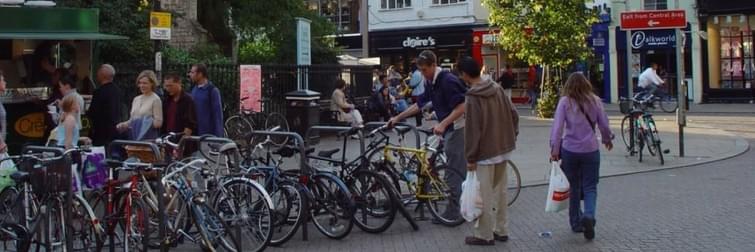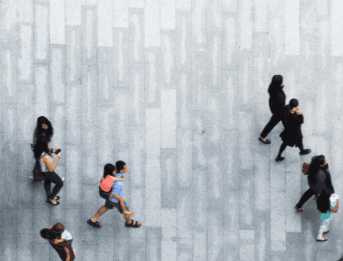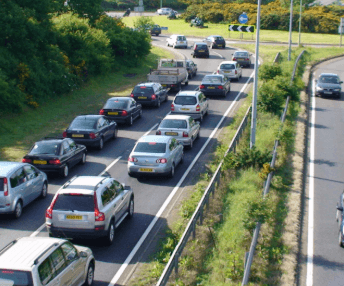
blog: Driving change - Inspiring car-free confidence
Thursday 12th March 2020
The role of cars in modern-day society extends far beyond their utility function as a mode of transport. Our cars have become a social statement, a means of expressing our identities and aspirations, a way of telling the world who we are and who we want to be.
Take a moment to imagine these three cars: a pink VW, a white van and a black BMW.
Now describe the driver of each vehicle.
The chances are that you found it easy, and perhaps even fun, to make decisions about their appearance, their profession, their personality traits and even how they drive?
Is it as easy to build an equally detailed description of a bus user or a cyclist? Perhaps not, but supposing that you answered ‘yes’ - were the attributes you assigned to these groups positive?
Our identities are shaped by pre-existing social constructs, stereotypes, popular culture and targeted marketing. The key to understanding the role that cars play in our self-expression is recognising that, knowingly or unknowingly, intentionally or unintentionally, we regard our possessions as parts of ourselves.
By asking an individual to give up their car in favour of more sustainable transport, we are asking them to surrender a part of their identity and step out of their comfort zone into the great unknown, supressing a behaviour and social conformity which they have subconsciously practiced for most of their adult life. To inspire real and lasting change, the benefits of change must outweigh the perceived sacrifice.

We know that cycling and walking are healthier, we know that they are cheaper, we know they are better for the environment. Whilst these benefits are often fundamental selling points of the behaviour change mantra, they simply don’t appeal enough to car users to trigger a majority modal shift. Traditional behaviour change programmes are effective but, for us to better understand where to focus our efforts and achieve better outputs in the future, we need to understand what motivates people.
Whilst perceived convenience and the lack of an ‘available’ alternative in rural areas are undoubtedly contributory factors in persistent car use, could stereotypes and emotional attachment to our cars and what they represent be fuelling our reluctance to change?
Inside your car, there are crumbs on the carpet and sticky wrappers forgotten under the seats. More importantly, there are those conversations you had while driving, the children soothed, the teenagers listened to (or lectured). There are great family holidays, the time your best friend told you she had cancer, the year you got divorced, and the summer you landed the job of your dreams. All of those memories are there, embedded in that car as if trapped in amber. - Holly Robinson
Our cars represent freedom, adventure, risk. They are time capsules of our lives, but would most of those things have happened without the car? Almost certainly.
As a nation, we still need convincing. We need to find new ways to evolve the sustainable transport offer but we are going to have to think outside the box and….possibly outside of the industry?
We’re not a million miles away. We’re already seeing mass transit portrayed as part of the fabric of city life in our films and TV shows. Whilst we’re unlikely to ever see adverts for public transport replace glossy car commercials on prime-time tv slots, I can’t help but feel that there is an opportunity for savvy businesses to give sustainable transport more airtime.
With media focus and public attention currently fixated on climate change, businesses that demonstrate their support for sustainability are rapidly gaining favour with a growing number of eco-conscious consumers.
As if that isn’t enough, congestion costs UK businesses hundreds of millions in lost productivity and time. Helping to reduce road traffic should be a no-brainer for businesses!

By associating desirable brands the consumer is already familiar with (and already using) with sustainable transport, we can give it mass appeal and help a wider demographic to see that sustainable transport is a good fit for their identity and lifestyle, effectively removing uncertainty around social acceptance and subconscious apprehension of identity crisis.
By showing relatable characters using sustainable transport we can influence people to envisage sustainable transport in their own lives, overcoming social categorisation barriers that places those who use sustainable transport in a different category to ‘us’. By tying in with the screenplay and story, we can show that good things happen on bikes, on trains, on buses and on trams, just as often as in cars. Above all we must recognise that behaviour change is a process, not an event. We may not yet have all the answers, but we’re on the right track and whether we’re talking about climate change, cultural change or behaviour change:
“Cooperation is the thorough conviction that nobody can get there unless everybody gets there.” — Virginia Burden (1957).
March is ITP's Smarter Travel Month, so keep an eye on our Twitter and LinkedIn pages for more great content or get in touch for more information.
